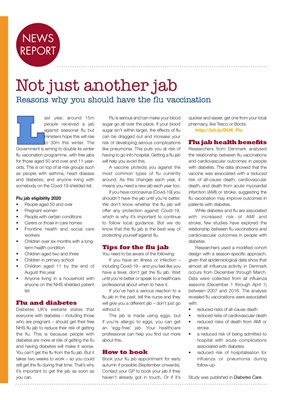
NEWS
NEWS
REPORT
Reasons why you should have the flu vaccination.
Not just another jab
L
ast year, around 15m
people received a jab
against seasonal flu but
ministers hope this will rise
to 30m this winter. The
Government is aiming to double its winter
flu vaccination programme, with free jabs
for those aged 50 and over and 11-yearolds. This is on top of at-risk groups
such
as people with asthma, heart disease
and diabetes, and anyone living with
somebody on the Covid-19 shielded list.
Flu jab eligibility 2020
• People aged 50 and over
• Pregnant women
• People with certain conditions
• Carers or those in care homes
• Frontline health and social care
workers
• Children over six months with a longterm health condition
• Children aged two and three
• Children in primary school
• Children aged 11 by the end of
August this year
• Anyone living in a household with
anyone on the NHS shielded patient
list
Flu and diabetes
Diabetes UK's website states that
everyone with diabetes - including those
who are pregnant - should get their free
NHS flu jab to reduce their risk of getting
the flu. This is because people with
diabetes are more at risk of getting the flu
and having diabetes will make it worse.
You can't get the flu from the flu jab. But it
takes two weeks to work - so you could
still get the flu during that time. That's why
it's important to get the jab as soon as
you can.
Flu is serious and can make your blood
sugar go all over the place. If your blood
sugar isn't within target, the effects of flu
can be dragged out and increase your
risk of developing serious complications
like pneumonia. This puts you at risk of
having to go into hospital. Getting a flu jab
will help you avoid this.
A vaccine protects you against the
most common types of flu currently
around. As this changes each year, it
means you need a new jab each year too.
If you have coronavirus (Covid-19) you
shouldn't have the jab until you're better.
We don't know whether the flu jab will
offer any protection against Covid-19,
which is why it's important to continue
to follow local guidance. But we do
know that the flu jab is the best way of
protecting yourself against flu.
Tips for the flu jab
You need to be aware of the following:
If you have an illness or infection -
including Covid-19 - and you feel like you
have a fever, don't get the flu jab. Wait
until you're better or speak to a healthcare
professional about when to have it.
If you've had a serious reaction to a
flu jab in the past, tell the nurse and they
will give you a different jab - don't just go
without it.
The jab is made using eggs, but
if you're allergic to eggs, you can get
an 'egg-free' jab. Your healthcare
professional can help you find out more
about this.
How to book
Book your flu jab appointment for early
autumn if possible (September onwards).
Contact your GP to book your jab if they
haven't already got in touch. Or if it's
quicker and easier, get one from your local
pharmacy, like Tesco or Boots.
http://bit.ly/duk_flu
jab health benefits
Researchers from Denmark analysed
the relationship between flu vaccinations
and cardiovascular outcomes in people
with diabetes. The data showed that the
vaccine was associated with a reduced
risk of all-cause death, cardiovascular
death, and death from acute myocardial
infarction (AMI) or stroke, suggesting the
flu vaccination may improve outcomes in
patients with diabetes.
While diabetes and flu are associated
with increased risk of AMI and
stroke, few studies have explored the
relationship between flu vaccinations and
cardiovascular outcomes in people with
diabetes.
Researchers used a modified cohort
design with a season-specific approach,
given that epidemiological data show that
almost all influenza activity in Denmark
occurs from December through March.
Data were collected from all influenza
seasons (December 1 through April 1)
between 2007 and 2016. The analysis
revealed flu vaccinations were associated
with:
• reduced risks of all-cause death
• reduced risks of cardiovascular death
• reduced risks of death from AMI or
stroke
• a reduced risk of being admitted to
hospital with acute complications
associated with diabetes
• reduced risk of hospitalisation for
influenza or pneumonia during
follow-up.
Study was published in Diabetes Care.